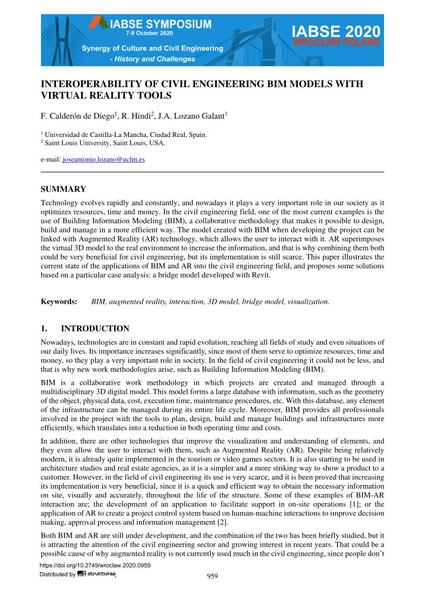Interoperability of Civil Engineering BIM Models with Virtual Reality Tools

|
|
|||||||||||
Détails bibliographiques
| Auteur(s): |
F. Calderón de Diego
R. Hindi J. A. Lozano-Galant |
||||
|---|---|---|---|---|---|
| Médium: | papier de conférence | ||||
| Langue(s): | anglais | ||||
| Conférence: | IABSE Symposium: Synergy of Culture and Civil Engineering – History and Challenges, Wrocław, Poland, 7-9 October 2020 | ||||
| Publié dans: | IABSE Symposium Wroclaw 2020 | ||||
|
|||||
| Page(s): | 959-966 | ||||
| Nombre total de pages (du PDF): | 8 | ||||
| Année: | 2020 | ||||
| DOI: | 10.2749/wroclaw.2020.0959 | ||||
| Abstrait: |
Technology evolves rapidly and constantly, and nowadays it plays a very important role in our society as it optimizes resources, time and money. In the civil engineering field, one of the most current examples is the use of Building Information Modeling (BIM), a collaborative methodology that makes it possible to design, build and manage in a more efficient way. The model created with BIM when developing the project can be linked with Augmented Reality (AR) technology, which allows the user to interact with it. AR superimposes the virtual 3D model to the real environment to increase the information, and that is why combining them both could be very beneficial for civil engineering, but its implementation is still scarce. This paper illustrates the current state of the applications of BIM and AR into the civil engineering field, and proposes some solutions based on a particular case analysis: a bridge model developed with Revit. |
||||
| Mots-clé: |
BIM
|
||||
